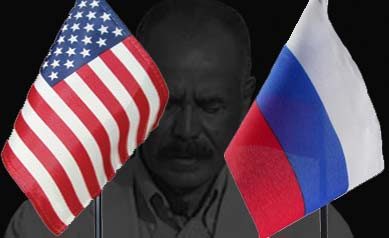Eritrea Annuls All Passports; Issues New Ones
Gedab News (April 18, 2010): Cash strapped and facing sanctions and asset-freezes, the Government of Eritrea has issued an order to its embassies to annul all Eritrean Passports and to require Eritrean passport-holders to apply for new ones by paying USD $200 (for expatriates) and Nakfa 3000 for Eritrean residents.
Unlike the old passports, which were valid for 5 years, the new ones will have to be renewed every 2 years. It appears that the purpose of the directive is not just as means to generate an immediate cash infusion but also stricter control of the Diaspora who were visiting Eritrean embassies only once every 5 years.
This is not the first time that the government has modified its passport policy, whose primary objective appears to be not to facilitate free movement of the people but a means to generate cash and to condition citizenship on one’s compliance with government policies.
Passport As Source Of Income
In 1998, shortly after the ignition of war with Ethiopia, the hard currency strapped Eritrean government began selling Eritrean passports to the “Bedoun”—literally “without”—stateless people who lived in Kuwait. The Eritrean government was not subtle about this: it advertised the availability of the passports in Arabic magazines in Kuwait.
In 2006, the Eritrean government offered Eritreans who want to leave the country legally a rare opportunity: for 100,000 Nakfa, they could be offered an exit visa, so long as they renounced their citizenship and agreed, in writing, never to come back. This policy was reversed immediately after the immigration office became inundated with requests.
Passport As A Political Tool
Given the high rate of defection, the government has instituted a policy on its senior officials: they are to maintain their passports at the security office of the Asmara Airport. The passport is handed to the officials only after the security office confirms with the Office of the President that the official is permitted to leave Eritrea.
The Eritrean passport which, by definition, is supposed to be the preserve of Eritrean citizens has also been doled out by the hundreds to foreign nationals who happen to be political allies of the government. Since the 1990s, the Eritrean government has issued hundreds of Eritrean passports to Sudanese, Ethiopian and Somali nationals, many of whom had been encamped in Eritrea as they waged their political and military campaigns against their native countries.
According to Kenya’s The Daily Nation (August 7, 2009), the Kenyan authorities deported two Eritreans, Hannibal Menghstie [sic] and Tewelde Habte Negash. The diplomat had been deported a month earlier and he returned to Kenya with a diplomatic passport.
The decision to reduce the expiration date of the passports from 5 to 2 years will be specially onerous on Eritreans residing in Middle Eastern countries who are required to have valid passports from their native country to secure employment in their host countries. When renewing their passports, they are asked to pay the passport fee, any 2% income tax in arrears (tax on income generated in the host country), as well as any other fee that was imposed by the ruling party (national defense fee, adopt-a-martyr fee, fight-the-sanction-fee, etc.)
Another rationale for changing the passports could be the government’s plan to make it difficult to track carriers of Eritreans passport with numbers already in international security data bases who are or will be included in the wanted list. For example, Yemane Gebreab, who is the Special Advisor to President Isaias Afwerki, as well as the Political Director of PFDJ (the ruling party) and the founder of the YPFDJ (its youth franchise), was named in President Obama’s executive order 13536 of April 12, 2010, as an individual whose assets should be frozen. He is also likely to be listed in the UN Sanction Committee’s list of individuals who are prohibited from traveling. Presumably, Yemane Gebreab, whose address is listed as being in 12 Keren St, Asmara, Eritrea, will be issued a new passport with a new address.
Apart from Yemane, several leaders and members of the Somali armed groups also carry Eritrean passports including Mukhtar Robow for whom the Eritrean government chose the town of Keren as a birth place. Muktar was included in The U.S. Department of the Treasury list on Nonember 20, 2008.
Copyright 2010 Gedab News (awate.com). All rights reserved. This material may be published, broadcast, or redistributed on conditions that awate.com or Gedab News are properly cited as a source. awateteam@awate.com



Awate Forum